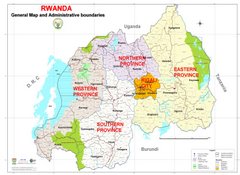Emmanuel MUNGWARAKARAMA
Hunger has more effects on a person than simply being hungry. It affects almost every aspect of a person's life. Besides a diminished health, improper nourishment does not provide an ample supply of energy to a person, hampering an adult's ability to perform everyday tasks, and a child's ability to learn.
If you are seven years old, routine is very important. Things like regular meals, going to school, meeting your friends and bedtime are an essential pattern of daily life, there are special days and special treats, but in the end, it's the dependability of the daily routine that keeps you feeling secure and happy.
It doesn't sound like too much to ask for. Yet for some children around Gikongoro, it is something beyond their wildest dreams.
These are the children who start each day feeling hungry and generally go to bed hungry at the day's end. They may or may not get something to eat in between. Almost certainly, they will have spent a large part of the day working, maybe tending animals, fetching water or carrying out household chores. Some of them, school plays no part in their lives. And as a result, they will grow up to be as poor as their parents and their children will probably have no more hopes than they do.
But it doesn't have to be like that. For one thing, there is more than enough means to produce in the world to push everyone a step forward: education for all as a government principle, technological advances have made it possible to increase yields and develop strains of crops suited to the harshest conditions. We just need the courage and determination to provide people with the means to help them.
But in the meantime, we have to make do with food aid. In many parts of the developing world this is still the key to breaking the cycle of poverty. Malnutrition starts in the womb; underweight mothers give birth to underweight babies. Malnutrition slows down and limits physical and mental development. And hungry children - even if they get to school - find it hard to concentrate and learn.
School feeding programs, such as those run by the Farmers to the future Initiative (FOFI) Program, supported by CARE-Rwanda have already made a huge difference to hundreds of Rwandan children. The benefits are multifold. First, school feeding ensures that children get at least one nutritious meal a day. Second, a full stomach improves children's ability to learn. And third, school feeding gives parents the incentive to send their children to school in the first place - and access to the education they need to make their lives better in the future.
As Karemera Protais, the program manager said, to fund a school feeding program will provide a lesson to children at school each day. By investing in children’s' education, a hope to have a lasting effect on them that will enable them to break free of the poverty cycle.
CARE with its collaborator FOFI, aims to assist to incorporate natural resource management subjects and linkages to agro-processing, preservation, storage, farmer-entrepreneurship, asset creation, marketing, and farmers’ organizations into basic education curriculums in 24 primary schools in 9 districts of 3 provinces.
The feeding program began four years ago in 2003. It has reduced student absences from 1080 in 2003 to 1600 now. Children want to come to school now. Cyanika Primary Headmistress, Xaverine MUKAMURARA “If you saw them in the year 2003, they were all very thin. Today our students are robust.”
A hungry child cannot concentrate on learning.
Food ensures that he or she gets an adequate education. And education again strengthens the country’s ability to develop. Jean Damascene Nsengiyumva, 17, benefits from the feeding program: “The food helps me not to fall asleep. I can follow what the teacher says so I can learn. Maybe later I can teach others.”
The objectives of school feeding programs are to provide meals to reduce short-term hunger in the classroom so that the students can concentrate and learn better, and to attract children to school and have them attend regularly.
Newly introduced school feeding program by FOFI-CARE has the potential to improve children’s learning performance.
Thursday, March 1, 2007
Subscribe to:
Post Comments (Atom)
Rwanda

Administrative map
Blog Archive
-
►
2010
(59)
- ► 09/19 - 09/26 (1)
- ► 07/11 - 07/18 (5)
- ► 07/04 - 07/11 (5)
- ► 06/27 - 07/04 (4)
- ► 06/20 - 06/27 (6)
- ► 06/06 - 06/13 (17)
- ► 05/30 - 06/06 (4)
- ► 03/28 - 04/04 (2)
- ► 02/28 - 03/07 (3)
- ► 02/21 - 02/28 (5)
- ► 01/24 - 01/31 (2)
- ► 01/17 - 01/24 (4)
- ► 01/10 - 01/17 (1)
-
►
2009
(25)
- ► 11/08 - 11/15 (9)
- ► 10/04 - 10/11 (2)
- ► 01/25 - 02/01 (2)
- ► 01/18 - 01/25 (12)
-
►
2008
(55)
- ► 12/28 - 01/04 (1)
- ► 12/21 - 12/28 (11)
- ► 12/14 - 12/21 (3)
- ► 12/07 - 12/14 (5)
- ► 11/30 - 12/07 (2)
- ► 11/16 - 11/23 (22)
- ► 11/09 - 11/16 (4)
- ► 07/13 - 07/20 (1)
- ► 06/01 - 06/08 (6)
-
▼
2007
(19)
- ► 05/20 - 05/27 (2)
- ► 04/01 - 04/08 (1)
- ► 03/04 - 03/11 (1)
- ▼ 02/25 - 03/04 (2)
- ► 02/18 - 02/25 (2)
- ► 02/11 - 02/18 (6)
- ► 02/04 - 02/11 (3)
- ► 01/28 - 02/04 (2)
-
►
2006
(59)
- ► 10/22 - 10/29 (12)
- ► 10/15 - 10/22 (1)
- ► 10/08 - 10/15 (2)
- ► 09/03 - 09/10 (2)
- ► 08/27 - 09/03 (6)
- ► 07/09 - 07/16 (7)
- ► 06/18 - 06/25 (1)
- ► 04/09 - 04/16 (5)
- ► 04/02 - 04/09 (23)
No comments:
Post a Comment